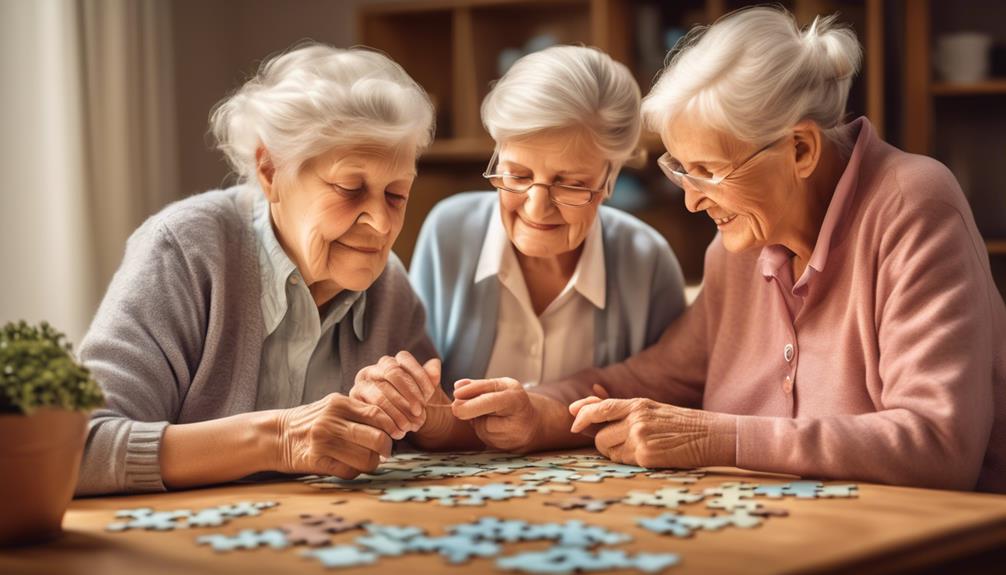During a recent event, it was observed that playing well-known songs evoked memories in a person with dementia, leading to instances of connection and joy.
Engaging activities and effective communication are vital in enhancing the quality of life for individuals facing cognitive challenges. By exploring tailored strategies like reminiscence therapy and multisensory stimulation, we can unlock meaningful interactions and create lasting connections with those impacted by dementia.
Let's explore more ways to enrich the lives of individuals with dementia through purposeful engagement and compassionate communication.
Key Takeaways
- Tailor activities to individual interests for purpose and fulfillment.
- Clear, simple communication aids comprehension and connection.
- Utilize memory aids like photos to spark meaningful interactions.
- Incorporate social activities for connections and mental well-being.
Engaging Activities for Dementia Patients
Engaging in stimulating activities tailored to their interests and abilities can significantly enhance the well-being and cognitive function of a person with dementia. As caregivers, it's essential to understand the profound impact that these activities can have on their overall quality of life. When we take the time to help them participate in activities like puzzles, reminiscence therapy, and music, we aren't only stimulating their memory but also improving their communication skills. These activities serve as a bridge to connect with them on a deeper level, allowing for moments of joy and engagement that are truly priceless.
Additionally, arts and crafts, gardening, and gentle exercises can foster creativity and physical movement, promoting a sense of accomplishment and well-being. By tailoring these activities to their personal interests and abilities, we provide them with a sense of purpose and fulfillment. Social activities, such as group outings or game nights, play a crucial role in fostering connections and social interaction, which are vital for their emotional and mental health. In helping them engage in these activities, we aren't just keeping them busy; we're enriching their lives and creating meaningful experiences that they'll cherish.
Effective Communication Strategies

As we strive to enhance the well-being and cognitive function of individuals with dementia, employing effective communication strategies is paramount in fostering meaningful interactions and understanding. When communicating with a person with dementia, it is crucial to use clear and simple language to aid comprehension. Maintaining eye contact and positive body language can significantly improve communication. Additionally, allowing time for responses and avoiding rushing interactions are essential for effective communication.
Here is a table summarizing key communication strategies:
| Communication Strategies | Description |
|---|---|
| Use simple language | Clear and straightforward language helps individuals with dementia understand better. |
| Maintain eye contact | Positive body language and eye contact enhance communication. |
| Allow time for responses | Patience is crucial; give individuals with dementia time to process and respond. |
| Utilize prompts | Pointing at objects or using visual cues can aid in enhancing understanding. |
| Stay calm and patient | Keeping a calm demeanor creates a conducive environment for effective communication. |
Creating Meaningful Interactions
To foster meaningful interactions with individuals experiencing dementia, it's essential to engage in activities that resonate with their interests and hobbies. When seeking to connect with a person in this situation, consider the following strategies:
- Utilize Memory Aids: Use tools like photo albums or familiar objects to help spark memories and facilitate communication, creating a bridge to their past experiences.
- Encourage Participation in Tasks: Engaging the person in simple tasks or games can promote interaction, provide a sense of accomplishment, and stimulate cognitive function.
- Incorporate Music: Music has a unique ability to evoke emotions and memories. Playing familiar songs can foster connections through shared experiences and create moments of joy.
- Explore Sensory Activities: Engage different senses by introducing activities like aromatherapy, textured objects, or nature walks. These sensory experiences can enhance communication and create meaningful interactions.
Supporting Cognitive Engagement

We recommend incorporating reminiscence activities to stimulate memory and cognitive function in individuals experiencing dementia. Reminiscence activities, such as looking through old photos, talking about past experiences, or listening to familiar music, can help trigger memories and encourage verbal communication.
Engaging in puzzles, word games, and brain teasers also promotes cognitive stimulation and enhances listening skills. Encouraging participation in creative outlets like painting, drawing, or music provides individuals with dementia opportunities to express themselves and engage cognitively.
Additionally, social interactions play a crucial role in supporting cognitive abilities and emotional well-being. Providing chances for individuals to interact with others through group activities, discussions, or simply spending time together can greatly benefit their cognitive engagement.
Incorporating multisensory activities like gardening or baking further stimulates various cognitive functions, making the overall experience more enriching and engaging for individuals with dementia.
Improving Quality of Life
Let's enhance the quality of life for individuals with dementia by focusing on personalized activities that cater to their interests and abilities. Here are some practical tips to improve their well-being:
- Tailor Activities: Customize activities to match their past hobbies or professions, promoting a sense of familiarity and accomplishment.
- Clear Communication: Use simple language and positive reinforcement during activities to ensure understanding and encourage participation.
- Therapeutic Approaches: Consider incorporating reminiscence therapy, music therapy, or art activities to evoke memories, emotions, and creativity.
- Social Engagement: Encourage regular social interactions and group activities to reduce feelings of loneliness, foster connections, and enhance their overall quality of life.
Frequently Asked Questions
What Are 5 Strategies You Should Use to Communicate With People With Dementia?
When communicating with people with dementia, we should use simple language, maintain eye contact, show patience, employ non-verbal cues, and create a calm environment.
These strategies help foster better connections and understanding.
What Communication Activities Can Help Dementia?
When communicating with people with dementia, it's crucial to understand the significance of engaging activities. By reminiscing about past experiences, sharing stories, or participating in music therapy, we can stimulate memories and emotions.
Incorporating sensory stimulation through touch, sight, and smell can also enhance communication. Furthermore, art therapy activities like painting and drawing offer a creative outlet for expression.
Simple games such as puzzles promote cognitive function and social interaction, benefiting individuals with dementia.
What Are 3 Things to Never Do With Your Loved One With Dementia?
When caring for a loved one with dementia, it's crucial to remember what not to do.
Avoid arguing with them, as it can worsen confusion. Refrain from ordering them around, as it may lead to frustration. Focus on their abilities, not limitations, to preserve self-esteem.
Never be condescending or talk down to them; it undermines their dignity. Minimize direct questions that require a good memory to reduce their stress and pressure.
What Is the Number One Trigger for Dementia Behavior?
Unfamiliar surroundings can truly throw us off balance. Changes in our environment, like moving to a new place or rearranging our space, can be the top trigger for challenging behaviors in individuals with dementia.
Sudden alterations can lead to confusion and distress, exacerbating symptoms. Loud noises, crowded areas, or harsh lighting only add to the overwhelm. Understanding and minimizing these triggers can make a world of difference in enhancing the well-being of those with dementia.
Conclusion
In conclusion, when interacting with individuals experiencing dementia, it's crucial to remember the adage 'patience is a virtue.'
By incorporating engaging activities, effective communication strategies, and creating meaningful interactions, we can support cognitive engagement and improve the quality of life for those with dementia.
Let's continue to approach each interaction with empathy, understanding, and a commitment to enhancing communication and connection with our loved ones living with dementia.









